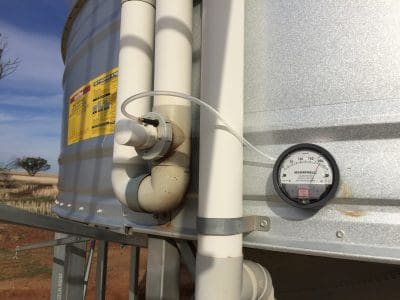WHAT is the most common cause of on-farm silo seal failures?

GRDC grain storage extension team member Ben White says empty pressure relief valves mean that silos will not retain fumigants. Photo: GRDC.
According to Grains Research and Development Corporation (GRDC) grain storage extension team member, Ben White, WA, who has tested hundreds of silos, it is empty silo pressure relief valves.
Mr White says a gas-tight silo is essential to maintain the fumigant gas concentrations required to kill stored grain insects at all life stages.
“If a silo is not gas-tight, the fumigation may appear successful when the adults die but the surviving eggs and pupae will continue to develop and reinfest the grain,” he said.
Mr White said that ahead of harvest, growers needed to ensure silo pressure relief valves were filled to the correct level with light hydraulic oil to maintain their seal.
“A sufficiently full valve allows a controlled volume of air exchange in and out of the silo without excessively diluting fumigant levels,” he said.
“Without oil in the valve, the silo will not retain fumigants such as phosphine and fumigation will not disinfest grain.
“If the silo doesn’t have an oil valve, it is safe to assume it does not seal and should not be fumigated.”
Mr White said once a silo pressure relief valve was filled with oil, growers should check that the silo seal exceeded a three-minute half-life pressure test. For new silos, half-life pressure tests should exceed five minutes.
“A pressure test is a measure of how well a silo will contain fumigation gas,” he said.
“Pressure testing silos needs to be part of the annual maintenance and it is much easier to replace seals and carry repairs out when silos are empty.
“However, a silo also needs to be pressure tested when full, before fumigating grain.
“This is especially important for silos with slide plate outlets that have been tested when empty – retest when full to make sure the pressure of the grain doesn’t compromise the seal.”
Contact: Ben White, 1800 WEEVIL (1800 933 845)
Visit: www.storedgrain.com.au
Source: GRDC


HAVE YOUR SAY